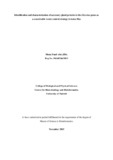| dc.description.abstract | Accessory gland proteins (ACPs) are reproductive proteins produced by the male accessory glands (MAGs) of most insect species. These proteins are essential for male fertility and play a major role in regulating female reproductive physiology and oviposition in insects like Drosophila melanogaster and Anopheles gambiae. ACPs therefore present attractive potential vector control entry points. Currently, there is limited information on the identity and organization of ACPs in the recently sequenced Glossina genus genomes. This study aimed to identify for the first time the presence of ACPs in the five publicly available genomes of the Glossina genus specifically: G.austeni, G.brevipalpis, G.fuscipes, G.morsitans and G.pallidipes insects. The availability of the Glossina genomes in VectorBase was exploited to explore the presence and diversity of ACPs. Orthologous genes in multiple Glossina species genomes were identified and their genetic diversity assessed using phylogenetic approaches. ACPs that are well characterized in Drosophila melanogaster and Anopheles gambiae genomes were used as reference sequences in this analysis. A total of 41 homologous clusters of Drosophila melanogaster, Anopheles gambiae and Glossina ACPs were identified. Amongst the 41 clusters, 12 clusters were composed of Drosophila melanogaster, Anopheles gambiae and Glossina orthologs, 7 clusters were exclusively Anopheles gambiae and Glossina orthologous ACPs while 5 clusters were exclusively Drosophila melanogaster and Glossina orthologous ACPs. The other 17 clusters were exclusive to either Drosophila melanogaster or Anopheles gambiae. These findings suggest that most ACPs are conserved in the order Diptera, despite its evolutionary radiation into multiple insect species. Further genetic characterization of Glossina ACPs will highlight novel strategies for field vector control. | en_US |

